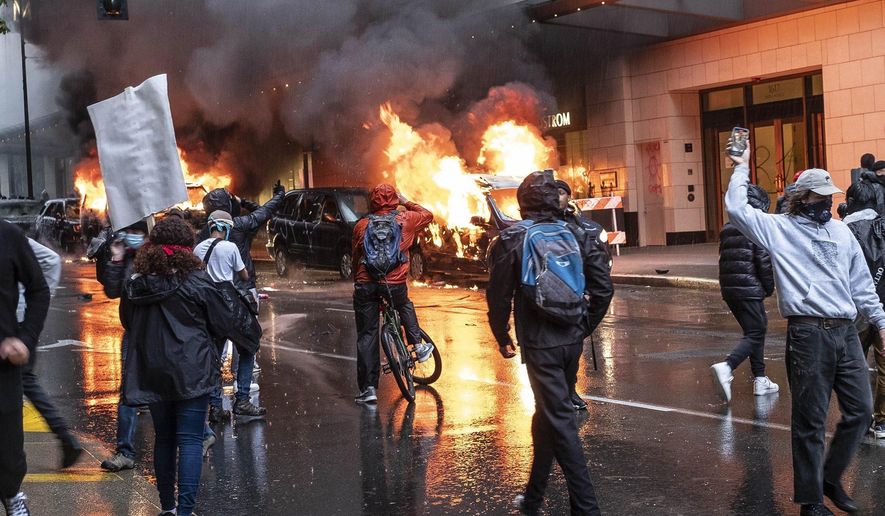OPINION:
My city of Seattle has been torched and terrorized for two months now by Antifa agitators playing a dangerous game of security dress-up. Enough is enough. While President Trump vows to use his power to restore civil order, there is a simple way, currently overlooked, whereby the administration can hold Seattle’s political class accountable for their failed policies and snag taxpayers tens of millions of dollars in the process.
Seattle officials never waste an opportunity to chastise the president publicly. When there’s an opportunity to pounce, a press release is distributed and a tweet sent dramatically framing themselves as heroes standing up to an authoritarian president. But what you may not know is that these same politicians breathlessly beg the White House behind the scenes to give them a valuable gift of land at practically no cost so that they can build another drug-friendly, homeless facility.
The Fort Lawton Army Reserve Center in the Magnolia neighborhood of Seattle was decommissioned in 2005, and subsequently leased to the city. This base occupies 34 acres of prime real estate abutting Seattle’s largest park. It’s easily worth $35 million by some estimates, probably more. Seattle, however, is attempting to obtain this property for pennies on the dollar under the Base Realignment and Closure (BRAC) process, which allows the transfer of decommissioned military bases to take place if the land will be used for a so-called public good — such as green space, a school or homeless housing.
But the BRAC guidelines also give the federal government flexibility to sell the land at a market rate if they determine that the public good proposal fails to meet statutory requirements. Seattle’s plan does just that.
City officials plan to build what sure looks like a methadone clinic for homeless people with severe drug addictions and psychotic predispositions. The redevelopment plan for this decommissioned base, for instance, includes 85 “supportive” units that “leverage outside behavioral health services, including chemical dependency treatment and mental health services, and bring providers onsite when possible.”
Seattle admits that “counselors” will be available 24-hours-a-day to mediate all the anti-social behavior expected at these units. There are even rooms reserved for “physicians and visiting nurses” to deal with drug-related episodes.
This may not be the place you’d like to raise your family. But to Seattle politicians, it’s the promised land.
In what epitomizes the folly of progressive social engineering, city leaders also propose using this federal property to build “affordable housing” for families making up 60% and 80% of the median income. In other words, Seattle is trying to force through a housing scheme that would, in the same structure, offer space for fathers to play catch with their sons and physicians to administer Narcan to overdosed addicts.
How is this a sane idea worthy of consideration, let alone deserving of federal resources during a pandemic?
In this still-fragile economy, the Trump administration should seek fair compensation for this valuable property rather than give it to an outright hostile local government for almost nothing. Why should Seattle get a deal? That’s an excellent question for the Department of Defense under Mark Esper and the Department of Housing and Urban Development under Ben Carson, the two bureaucracies overseeing this land acquisition.
Since Seattle is trying to acquire federal land, the city’s redevelopment plan literally hinges on White House approval. Ben Carson’s HUD reviews the BRAC application to determine the “impact of proposed homeless assistance on communities in the vicinity of the installation, including whether the plan is feasible,” among other potentially adverse effects.
Ben Carson could tell Seattle to pound sand.
The secretary certainly has evidence to argue that, rather than compassionately offer vulnerable populations a pathway toward recovery, Seattle’s backward approach creates corridors of misery. The city is now 15 years into their 10-year plan to “end homelessness” and — surprise, surprise — homelessness is much worse. And that’s because public officials have decriminalized hard drugs by refusing to prosecute offenders. Open-air narcotics is now a fixture on Seattle’s streets, notably seen in tent encampments.
Homeless populations, especially those who struggle with drug addiction, are attracted to Seattle because they know that their destructive habits will be enabled. Crime, predictably, has spiked in neighborhoods with similar housing projects, as some homeless steal and pilfer from law-abiding citizens to support their addiction. Homeless addicts are so emboldened by Seattle’s “social justice” approach to treatment, that they are now posting up tents directly by residential homes. And the problem will worsen as the city council moves to cut 50% of the police budget and the county moves to close the Seattle jail.
Seattle’s Fort Lawton redevelopment plan should be rejected and the White House should seek fair market value for the military land. Why subsidize more of Seattle’s failures at taxpayer expense?
• Jason Rantz hosts a daily, afternoon drive talk show on KTTH Seattle and is a frequent guest on Fox News. Follow him on Twitter @JasonRantz.




Please read our comment policy before commenting.